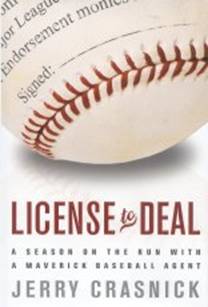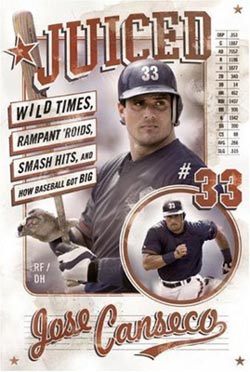The Sports Junkie's Book of Trivia, Terms & Lingo, by Harvey Frommer
Frommer's latest work, Sports Junkies' Book of Trivia, Terms and Lingo, provides a resource to solve a problem I didn't know I faced. That problem is to find the origin and/or meaning of various sports terms, many of which have become so commonplace that most of us no longer have any idea of their sources. Frommer's book endeavors to fill that imformational void, though I think with only moderate success.
Certainly, there can be no question that the book contains a lot of information. Frommer evidently combined two of his previous works to make this book, and it shows: An inch-thick paperback with dozens of terms on most pages. Like any dictionary, encyclopedia or other reference book, this one simply cannot be read straight-through, and I'm sure that Frommer did not intend anyone to do so. Just the "important" part of the book, i.e. the Baseball section, contains hundreds of terms, and even if you could read them all, you'd never be able to commit them all to memory. It is, however, a useful book if you want to know to whom a certain player's nickname belongs (like for example), or what a term means (i.e. that a lazy, fly ball called a "can of corn"), or when a team's name changed (Like the Yankees, who used to be the Highlanders, who used to be the Baltimore Orioles) and so on.
Frommer covers all the "major" sports, like football, basketball, golf and hockey as well, but there is also a lot of space taken up on less traditional games. Archery, badminton, figure skating, volleyball, decathalon, tiddlywinks...you name it, he's got some terms for you. He goes into more depth with certain terms and nicknames that he deems worthy of said attention, for certainly we should talk about "The Great Bambino" more than say, "Nails", or some arcane fly-fishing term, and that's fine.
Personally, I'm not all that interested in any of the terminology pertaining to cricket or curling, or anything other than baseball, for that matter, but then I'm something of a freak in that regard. I can understand that some people do like sports other than America's Pastime, so the ever-diplomatic Frommer makes sure he's got something for everybody.
I do have two minor problems with the book, but neither is really a reason not to buy it. Problem #1 is that the book isn't really complete. Frommer is from New York, even though he lives in New Hampshire now and teaches at Dartmouth, and his heavy New York bias shows. He has lots of terms and nicknames for players and teams from New York, but doesn't give the same in-depth treatment to say, Detroit, Houston, or Anaheim, for example. Hard to blame him for that, since it would be impossible to really cover every possible term and nickname, and Frommer never says that his list is exhaustive, but it's still something to consider. A book of nicknames that includes the ever-popular "Tanglefoot Lou" as one of Hall of Famer Lou Gehrig's nicknames and leaves out much more interesting fare like "Bear Tracks" and "Death to Flying Things", cannot be considered complete.
A related, but somewhat different issue (call it problem "1a"), is that the book does not really explain the origins of certain terms and names. Frommer tells you everybody who ever had the nickname "Moose" in professional baseball, for example, and sometimes the reasons for the nicknames, but does not often explain the origin of a term, such as why a high, lazy, fly ball is called a "can of corn" or where the term "rhubarb" (a heated on-field argument) comes from. This book could have been to baseball what "Red Herrings and White Elephants" is to the English language, but it's not. That would have been my personal preference, but it would have been an enormous amount of research work, and not everybody has the thirst for esoterica from which I suffer, so I can understand why Frommer did not follow this path.
Problem #B, one that may be less of an issue for my readers than it was for me, is that most of this book is re-hashed from other stuff Frommer has written. Indeed, the publisher's website indicates that it is a combination of two other books Frommer wrote, both over a quarter of a century ago, Sports Lingo and Sports Roots. Certainly, there is some newer information in it, but if you've read any of Frommer's 37+ other books, or his website, then you've read a lot of this before. Or at least I have.
On the other hand, with all that info in one place, it's still a handy reference tool, and can be recommended on that basis alone.




